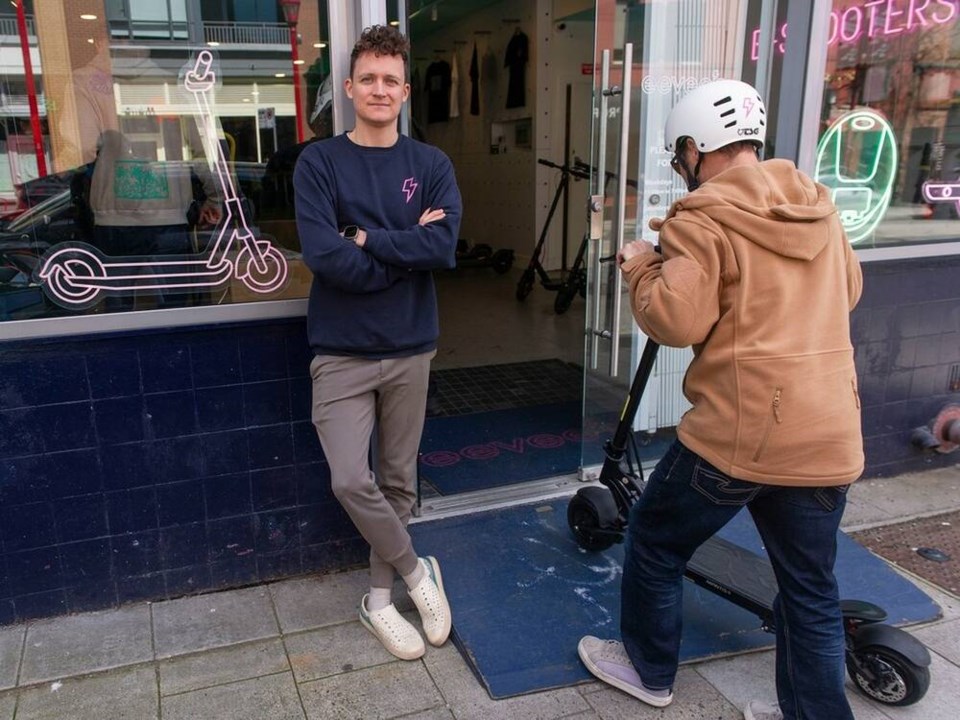Bradley Spence is the co-founder of Eevee’s, an electric scooter shop on East Pender Street. His business, like many others in the area, has been plagued by vandalism, but he is hopeful the situation will improve. He says he has noticed more police patrols since Ken Sim was elected mayor.
In the two years since opening his electric scooter store in Vancouver’s Chinatown, Bradley Spence and his business partner have spent at least $50,000 repairing broken windows and installing metal shutters to protect the storefront.
Spence has insurance for the East Pender Street store, called Eevee’s, but the cost of the deductible plus the ensuing spike in insurance premiums is more than paying for the repairs out of pocket.
It’s a problem facing entrepreneurs in Metro Vancouver and urban centres across the province, which is why the official Opposition introduced a private member’s bill Monday that would give financial relief to small businesses targeted by vandals.
The Small Business Crime and Vandalism Review Act calls for a review of the impacts of property crime on small businesses and for funding options that could cover the costs of replacing broken windows, cleaning graffiti and beefing up security measures.
The proposed bill, said BC United house leader Todd Stone, aims to tackle “the rapid increase in crime and vandalism and social disorder which is hitting small businesses really, really hard.”
Some business improvement associations have funding to cover vandalism, but this isn’t consistent across the province, Stone said.
Getting government funding to assist with repairs “would definitely help,” Spence said, but he’d rather see proactive solutions — such as increased police patrols — that would stop vandalism from happening in the first place.
“It’s coming out of my taxes anyway and everybody else’s taxes so I prefer to get taxed less,” he said.
Spence made the news last summer when he personally confronted a vandal who graffitied over a mural at a neighbouring East Pender Street business. Spence’s surveillance cameras captured the vandal with distinctive blue hair defacing the mural and when he saw the man the next day, he called police hoping for an arrest. When a dispatcher refused to send officers, Spence took action himself, confronted the man and captured it on a video that went viral.
Spence said since Mayor Ken Sim and his ABC Vancouver party came to power in October, he’s seen more police patrols and a noticeable decline in vandalism and graffiti at his business.
While private member’s bills are rarely passed by government, the bill has the backing of the Chinatown Business Improvement Association.
“I think that’s a great idea,” said Jordan Eng, the association’s president. The association currently spends $240,000 a year — about half its budget — on private security for Chinatown businesses. But that still doesn’t stop vandals from breaking glass or spraying graffiti, the costs of which are often borne by business owners either through soaring insurance deductibles or fronting the repair costs themselves, he said.
Since 2018, businesses and cultural organizations in Vancouver’s Chinatown have been regular targets of vandalism, broken windows and defaced storefronts.
As a result, Vancouver city council in January approved a $2-million revitalization plan for Chinatown that aims to clean up the neighbourhood through graffiti removal and support for businesses targeted by vandals.
Asked Tuesday about whether he supports such a vandalism relief fund, Premier David Eby did not directly answer, but said he’s tasked Jobs Minister Brenda Bailey to work with business improvement associations across B.C. to find ways to support small businesses, particularly in downtown cores.
“We know [small businesses] face a lot of stress due to reduction in foot traffic during the pandemic and now are seeing in the streets some of the impacts of the toxic-drug crisis and the housing crisis our provinces faces,” Eby said.
— With files from Sarah Grochowski



